|
|
|
Sort Order |
|
|
|
Items / Page
|
|
|
|
|
|
|
| Srl | Item |
| 1 |
ID:
019688
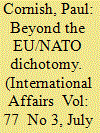

|
|
|
|
|
| Publication |
2001.
|
| Description |
587-603
|
|
|
|
|
|
|
|
|
|
|
|
|
|
|
|
| 2 |
ID:
086947


|
|
|
|
|
| Publication |
2009.
|
| Summary/Abstract |
The Labour government's 1998 Strategic Defence Review (SDR) marked the end of almost twenty years during which Labour had been little more than a bystander in British defence policy-making. The 'foreign policy-led' SDR marked an impressive and authoritative debut, emulated by other national governments. Ten years later, however, the SDR is a fading memory. British defence is out of balance and facing immense stress, and calls are mounting for a new strategic defence review. This article examines the difficult choices which a defence review would have to make. But a defence review also requires the governmental machinery with which to analyse and understand defence, and with which those difficult choices can be made. The article argues that this machinery is wearing out. Defence policy, planning and analysis in the United Kingdom have reached a state of organizational, bureaucratic and intellectual decay which may be irrecoverable.
|
|
|
|
|
|
|
|
|
|
|
|
|
|
|
|
| 3 |
ID:
095069


|
|
|
|
|
| Publication |
2010.
|
| Summary/Abstract |
With a strategic defence review expected to begin in 2010, this article reflects upon the history of the review in British defence policy and planning. The authors argue that for decades successive defence reviews have followed a process in which policy development moves through four phases: failure, inertia, formulation and misimplementation. This has resulted in a cycle of defence reviews that have proved to be incomplete and unsustainable: a cycle in which each review leaves so much unfinished business that another radical reappraisal of defence policy is soon thought necessary, and a cycle from which a succession of governments have so far proved unable or unwilling to escape. The article suggests that the strategic defence (and security) review promised for the next parliament is in danger of continuing this pattern of policy deficiency. The authors contest that this need not be the case. With a close understanding of the pattern of past reviews it should be possible for the 2010 review finally to break the mould and produce a coherent and above all sustainable defence policy and strategy.
|
|
|
|
|
|
|
|
|
|
|
|
|
|
|
|
| 4 |
ID:
138351
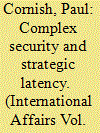

|
|
|
|
|
| Summary/Abstract |
Whichever party or parties form the next UK government, a Strategic Defence and Security Review (SDSR) is expected to begin soon after the general election in May. The review might be a ‘light touch’ exercise—little more than a reaffirmation of the SDSR produced by the coalition government in 2010. It seems more likely, however, that the review will be a lengthier, more deliberate exercise and one which might even last into 2016. For those most closely engaged in the process the challenge is more complex than that confronted by their predecessors in 2010. The international security context is more confused and contradictory; the UK's financial predicament is still grave; security threats and challenges will emerge that cannot be ignored; the population's appetite for foreign military engagement appears nevertheless to be restricted; and prevailing conditions suggest that the risk-based approach to national strategy might be proving difficult to sustain. Two key questions should be asked of the review. First, in the light of recent military experiences, what is the purpose of the United Kingdom's armed forces? Second, will SDSR 2015–16 sustain the risk-based approach to national strategy set out in 2010, and if so how convincingly? Beginning with a review of the background against which SDSR 2015–16 will be prepared, this article examines both enduring and immediate challenges to the national strategic process in the United Kingdom and concludes by arguing for strategic latency as a conceptual device which can complement, if not reinvigorate, the risk-based approach to national strategy and defence.
|
|
|
|
|
|
|
|
|
|
|
|
|
|
|
|
| 5 |
ID:
103296


|
|
|
|
|
| Publication |
2011.
|
| Summary/Abstract |
The history of British defence reviews has been one of repeated disappointment: a cycle in which policy failure is followed by a period of inertia, giving way to an attempt at a new policy framework which is then misimplemented by the defence leadership. Each failed defence review therefore sows the seeds of its successor. With this in mind, in 2010 the new coalition government embarked upon an altogether more ambitious exercise: a strategy review comprising a National Security Strategy and a Strategic Defence and Security Review. This article suggests, nevertheless, not only that the 2010 strategy review looks likely to follow past performance, but also that it is coming unstuck at an unprecedented rate. This is a pity since the 2010 review had much to commend it, not least the adoption of a risk-based approach to security and defence policy-making. What is the explanation for this outcome? Is it that the British have, as some have suggested, lost the ability to 'do strategy', if ever they had it? The authors offer a more nuanced understanding of the policy process and argue that the coalition government in fact has a very clear and deliberate strategy-that of national economic recovery. Yet the coalition government cannot allow national defence and security to fail. The authors conclude with an assessment of the options open to the defence leadership as they seek to address the failing 2010 strategy review and suggest a variety of indicators which will demonstrate the intent and seriousness of the political, official and military leadership of the Ministry of Defence.
|
|
|
|
|
|
|
|
|
|
|
|
|
|
|
|
| 6 |
ID:
123887


|
|
|
|
|
| Publication |
2013.
|
| Summary/Abstract |
The next Strategic Defence and Security Review (SDSR) will be held in 2015. With unfinished business from its 2010 predecessor, and with no sign that UK national strategy is about to escape the grip of austerity, the 2015 SDSR is set to be more complex and contentious than the government might have hoped.
There is a possibility that the review will, yet again, see the three armed services struggle against each other to secure the largest slice of a diminishing cake. The review might also be captured by a fruitless discussion of 'grand strategy'. SDSR 2015 must avoid both of these distractions.
There are four principal concerns arising from SDSR 2010: the feasibility of the Future Force 2020 plan, various capability gaps that must be managed, inconsistencies in the national strategic planning framework, and unresolved concerns about the relationship between society, armed forces and government in the UK.
In response to these concerns, the authors argue for a risk-sharing approach to the SDSR, embracing the widest conceivable range of stakeholders in national strategy: the armed services, government departments and agencies, industry, civil society, and allies and partners.
In UK military circles, inter-service cooperation is known as 'jointery' and is denoted by a certain shade of purple. The effect of austerity is to constrain national strategy, just as the international security environment makes ever more demands upon it. In these circumstances, strategic options must be generated by joint collaboration, denoted by as many shades of purple as appropriate.
|
|
|
|
|
|
|
|
|
|
|
|
|
|
|
|
| 7 |
ID:
139039
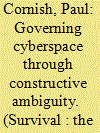

|
|
|
|
|
| Summary/Abstract |
At its simplest, cyberspace is a global medium for communication and information exchange between computers and their human operators, an environment (of sorts) in which it is possible for digital signals to be sent, received and processed. Like other communications media, the operating
conceit of cyberspace is that it should be indifferent to the quality and meaning of the traffic it carries. It comes as no surprise, then, that cyberspace can be a vehicle for challenge, insecurity, instability, crime and competition. But it can just as often signify opportunity: commercial, economic, cultural, political, social and even moral, in terms of individual human fulfilment.
|
|
|
|
|
|
|
|
|
|
|
|
|
|
|
|
| 8 |
ID:
091629


|
|
|
|
|
| Publication |
2009.
|
| Summary/Abstract |
Preparations for the next UK defence review are under way; a struggle is imminent and the lines of battle are being drawn. There is a grave danger that in the new 'age of austerity' defence planning-and strategy generally-will be driven by tribal conflicts, either between supporters of one or other of the armed services or between contending viewpoints about the nature of conflict. And there will be others who will argue that the defence review should be driven simply by the need to reduce government expenditure, as quickly as possible. These arguments not only reduce the defence debate to a struggle between various incompatible and uncompromising tribal beliefs-'war among the fetishes', perhaps-they also miss the point. This article gauges the extent of the economic challenges which the UK defence establishment will confront over the coming decade. The authors consider how best to approach the problem of undiminished (and even expanding) commitments at a time of decreasing resources. They argue that defence planning should be driven by the notion of value (the ratio of function to cost), which in turn requires both a clear national political vision and a defence establishment which is output- rather than input-oriented. Finally, the authors assert that defence must transform itself to be able to achieve the outputs required in the most efficient and responsive manner.
|
|
|
|
|
|
|
|
|
|
|
|
|
|
|
|
| 9 |
ID:
012773
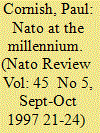

|
|
|
|
|
| Publication |
Sept-Oct 1997.
|
| Description |
21-24
|
|
|
|
|
|
|
|
|
|
|
|
|
|
|
|
| 10 |
ID:
111909


|
|
|
|
|
| Publication |
2012.
|
| Summary/Abstract |
One of the first steps taken by the newly elected Conservative-Liberal Democrat coalition government was to initiate a review of the national strategy of the United Kingdom. The review culminated in October 2010 in the publication of a revised National Security Strategy as well as a new Strategic Defence and Security Review. With the benefit of over twelve months of hindsight, this article is concerned with the formulation, the implementation and the longer-term implications of the 2010 strategy review. The first part of the article assesses the review as a national strategic plan. What were the strategic challenges addressed by the review, what decisions, judgements and misjudgements were made, and what was overlooked? In part two the authors turn to operational matters: how far was the UK's post-review strategic experience (i.e. in Afghanistan and Libya) consistent with the decisions and promises made in 2010? Part three discusses the review as a public statement of national policy, gauging the impression it has made on the national strategic narrative since 2010: how was the review received, what reputation has it acquired and what was/is the quality of the debate surrounding it? Finally, in part four the article asks what the 2010 review and its aftermath reveal of the formulation and implementation of national strategy in the United Kingdom. Was the 2010 review simply the latest in a long series of attempts by government to find a convincing and durable compromise between security challenges and national resources? Or was the review the beginning of something different altogether? Could UK national strategy henceforth be more of an adaptive, iterative process than a compressed period of analysis and reflection followed by the publication of a policy statement with an inevitably brief shelf-life?
|
|
|
|
|
|
|
|
|
|
|
|
|
|
|
|
| 11 |
ID:
066038


|
|
|
| 12 |
ID:
096754
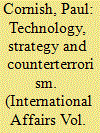

|
|
|
|
|
| Publication |
2010.
|
| Summary/Abstract |
For as long as there has been technology (the application of science and innovation) and for as long as there has been strategy (the use of forces and resources to achieve political goals) there has been a relationship of sorts between these two preoccupations. This article inquires into the nature of the technological-strategic relationship which governments, such as that in the UK, draw upon as they confront international terrorism. To what extent has the historical technostrategic dynamic remained relevant and useful, and where has new thinking been required? The article suggests that a new and more complex understanding of the technology-strategy relationship is emerging in the context of counterterrorism. The challenge facing government is to maintain a technological edge against its terrorist adversary, without exaggerating the adversary's capability, and while ensuring that its counterterrorism strategy pursues a coherent and persuasive political goal.
|
|
|
|
|
|
|
|
|
|
|
|
|
|
|
|
| 13 |
ID:
086941
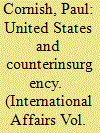

|
|
|
|
|
| Publication |
2009.
|
| Summary/Abstract |
According to the status of forces agreement signed by Iraq and the United States in November 2008, US troops are to be withdrawn entirely from Iraq by the end of 2011. A few days later it was also revealed that the British force in Iraq, numbering about 4,100 troops, will be reduced to a contingent of just a few hundred military advisors by summer 2009. The counterinsurgency campaign in Afghanistan, on the other hand, is to be intensified in the form of a 'surge' in military and political effort. Counterinsurgency operations in both Afghanistan and Iraq have long been at the centre of the security policy debate in the United States and elsewhere; a debate which seems unlikely to be resolved in the near future. But what exactly is counterinsurgency? This article offers some reflections on the practice and the politics of an especially complex form of military engagement. All military activity should be understood through the prism of politics, and counterinsurgency particularly so.
|
|
|
|
|
|
|
|
|
|
|
|
|
|
|
|
|
|
|
|
|